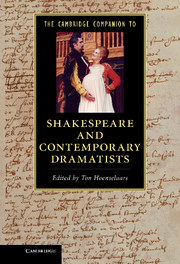Book contents
- Frontmatter
- Contents
- Illustrations
- Contributors
- Preface
- Chronology of the life and work of Shakespeare and contemporary dramatists
- 1 John Lyly and the University Wits
- 2 Thomas Kyd and the Elizabethan blockbuster
- 3 ‘The words of Mercury’
- 4 The dyer’s hand
- 5 Urbane John Marston
- 6 Thomas Dekker and the emergence of city comedy
- 7 Shakespeare
- 8 Thomas Heywood
- 9 George Chapman’s learned drama
- 10 Francis Beaumont and John Fletcher’s tragicomedy as musical melodrama
- 11 Thomas Middleton and the early modern theatre
- 12 John Webster
- 13 John Ford
- 14 Philip Massinger
- 15 Richard Brome and the idea of a Caroline theatre
- 16 Troublesome histories
- Select bibliography
- Index
- References
12 - John Webster
Collaboration and solitude
Published online by Cambridge University Press: 05 December 2012
- Frontmatter
- Contents
- Illustrations
- Contributors
- Preface
- Chronology of the life and work of Shakespeare and contemporary dramatists
- 1 John Lyly and the University Wits
- 2 Thomas Kyd and the Elizabethan blockbuster
- 3 ‘The words of Mercury’
- 4 The dyer’s hand
- 5 Urbane John Marston
- 6 Thomas Dekker and the emergence of city comedy
- 7 Shakespeare
- 8 Thomas Heywood
- 9 George Chapman’s learned drama
- 10 Francis Beaumont and John Fletcher’s tragicomedy as musical melodrama
- 11 Thomas Middleton and the early modern theatre
- 12 John Webster
- 13 John Ford
- 14 Philip Massinger
- 15 Richard Brome and the idea of a Caroline theatre
- 16 Troublesome histories
- Select bibliography
- Index
- References
Summary
The life and work of John Webster suggest a fundamental and probably generative paradox. On the one hand, he was deeply and continuously conditioned by urban networks generated from his father’s business, his education and his collaborative work in the theatre. On the other hand, his erudition, literary ambition and individualised poetic achievement seem to reflect some measure of independence and solitude.
Especially after Mary Edmond’s identification of Webster’s father as a wealthy coach-maker in London, it has become possible to trace certain social networks that generated collaborative relationships and even shaped ideological proclivities throughout the playwright’s life: Webster’s involvement with his father’s coach-making business and the guild that was associated with it, the Merchant Taylors’ Company; the dramatist’s probable attendance first at Richard Mulcaster’s Merchant Taylors’ School and later at the Middle Temple; his early playwriting apprenticeship as one of ‘Henslowe’s hacks’ with citizen-dramatists such as Thomas Dekker and Thomas Middleton, with whom he would continue to write collaborative plays his entire career; an identification with city-based Protestant values opposed to the court of James I; and a corresponding sympathy with the fifth column of militant Protestants galvanised in James’ court around the figure of William Herbert, Earl of Pembroke. Webster may have worked for his father’s coach-making enterprise, taking care of the business side of things as M. C. Bradbrook has speculated, becoming a full member of the Merchant Taylors’ Company in 1615. In 1624, he was honoured to serve as official poet for the company, designing the festivities for the investiture of Sir John Gore, a merchant taylor, as Lord Mayor of London.
- Type
- Chapter
- Information
- Publisher: Cambridge University PressPrint publication year: 2012



